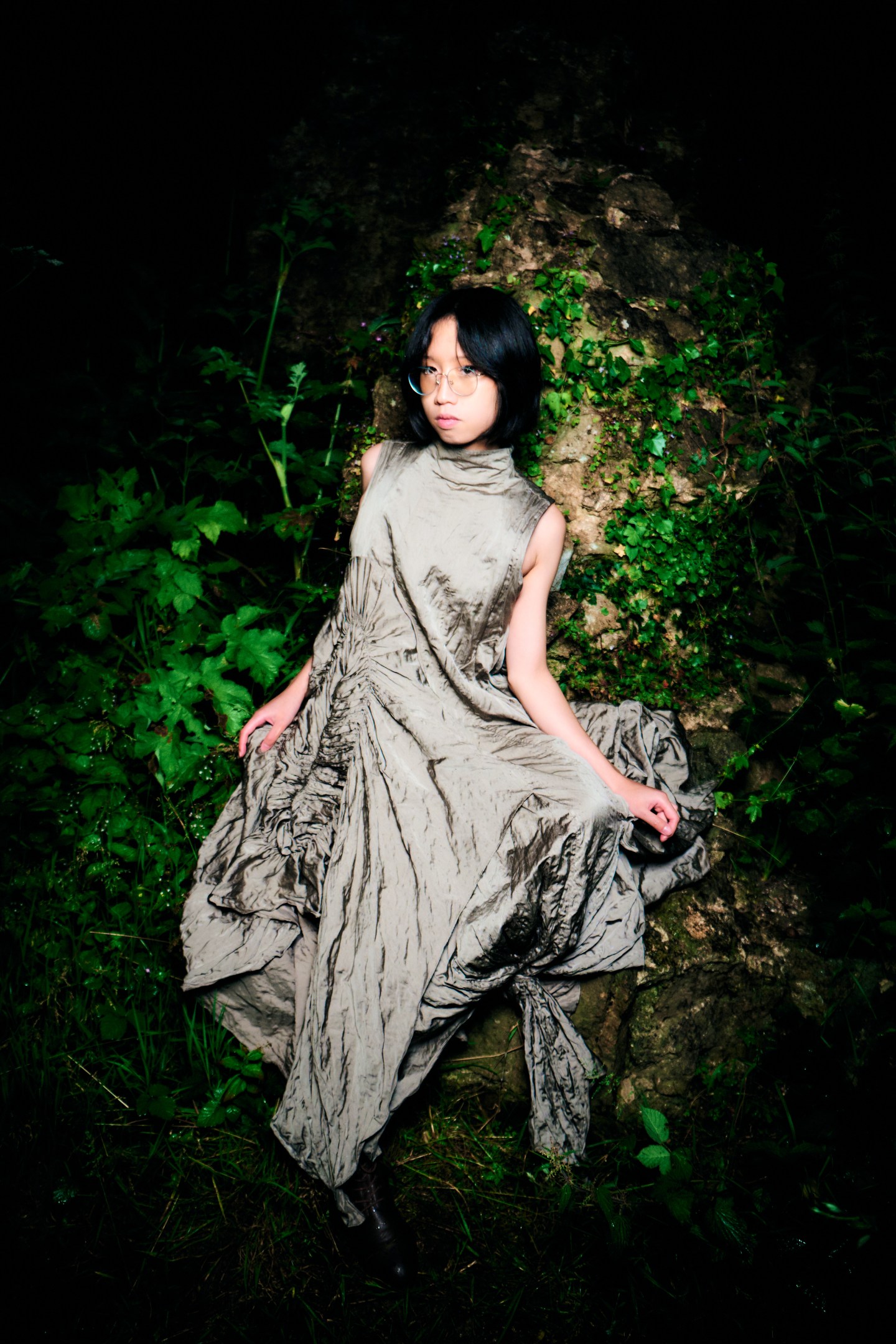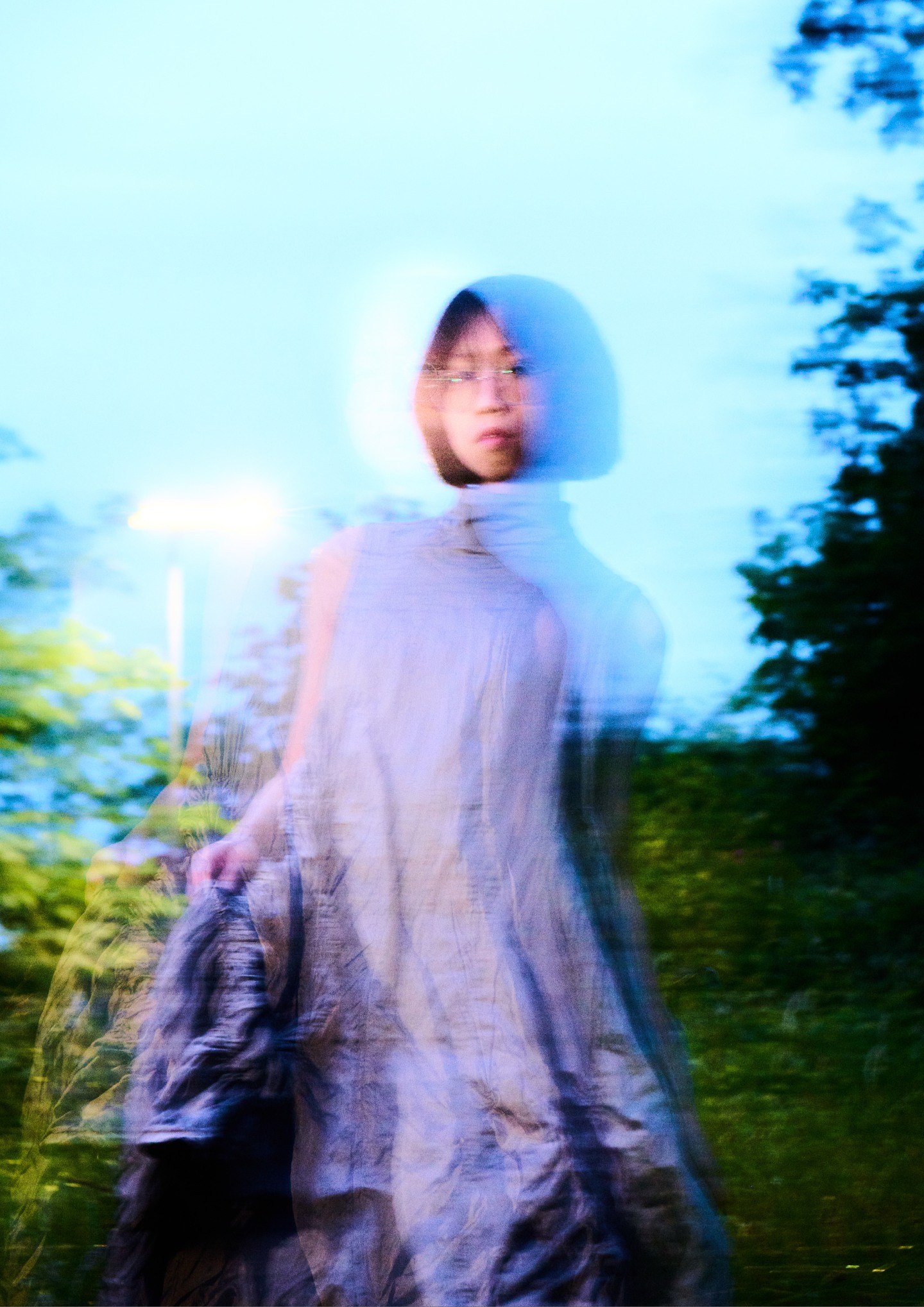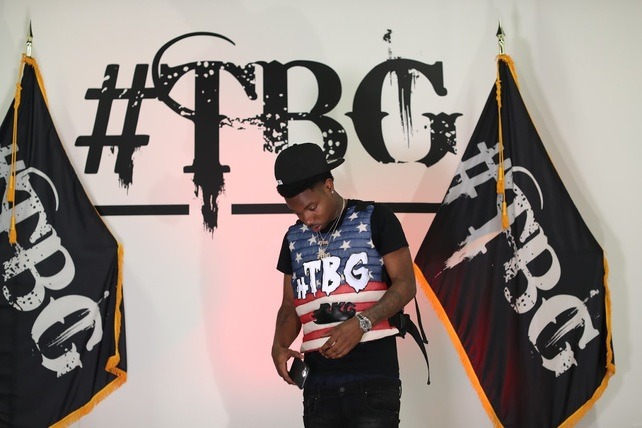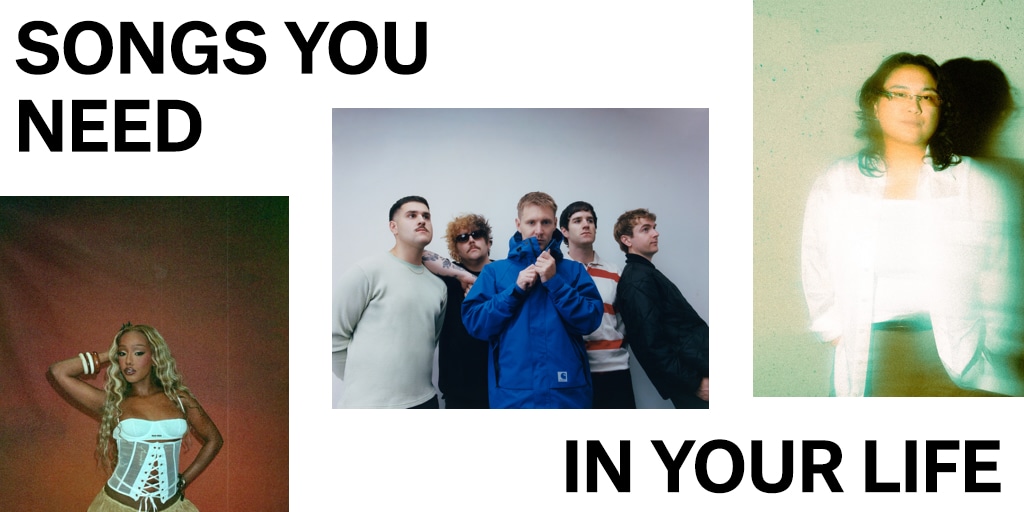gyrofield. Photo by Nicolas Hadfield.
Just before the end of our interview, gyrofield, the electronic musician born Kiana Li, receives a text from their mum. They hold it up to their computer’s camera so I can see the image: a picture of a vinyl copy of These Heavens, gyrofield’s new four-track EP, out today. “She insisted on buying a copy from the store,” gyrofield says with a smile. Then, they’re hit with a wave of gravity: “This is actually my first vinyl release ever.” It’s a significant if overwhelming moment for an artist whose journey and sound are quite unlike those of anyone else working in drum and bass today.
gyrofield’s story begins in Hong Kong, where their introduction to electronic music came from the internet. At first an ardent techno head, they began releasing music in 2018. The following year was a major one for gyrofield: they came out as transgender and shared their second EP Evaluate Me, a release that, along with the one-off single “Out of my Mind,” would help make them one of D&B’s most intriguing new talents. Within a year, they were off to study in Bristol; soon after, they went to the club for the first time. Four years and one momentum-stalling, soul-crushing lockdown later, gyrofield continues to build a catalog with depth and diversity of sound. They’ve released projects on key labels like Mau5trap, Metalheads, Critical, Deadbeats, and now, with These Heavens, XL.
Like all gyrofield releases, These Heavens originates from an endlessly searching impulse. Reading Stephen Hawking’s groundbreaking cosmology book A Brief History of Time gave them a newfound appreciation for not just our universe’s beauty, but also our desire to know it. “The scale and the vastness of it is nothing without our very human pursuits of understanding it,” they say. “Someone had to have the guts, the knowledge and ruthlessness, to pursue the truth of why we are and why we belong here.”
gyrofield was especially enamored with how A Brief History of Time painted a “beautiful clash of the theological and ideological versus the strict discipline of science.” They wanted the sound of These Heavens to reflect a clash between the popular conceptions of drum and bass — The Matrix and other tentpoles of ’90s media — and its undersung technical and compositional elements.
Opening track “Vega” announces this push and pull with vigor, pairing classic D&B propulsion with synthetic melodies that glitter, skronk, yell, and soothe. “Lagrange,” a song partially inspired by Hideo Kojima’s video game Death Stranding, fuses Rephlex-era IDM with treacle-sweet vocals that wouldn’t be out of place at a festival on Miami Beach. Even the beefier moments like the pirate radio-ready “Occam’s Razor” and the final track “Cold Cases,” a song gyrofield lovingly refers to as “the dumbest arrangement I’ve ever made,” resist categorization and reveal new depths to their dancefloors.
Just a few days before the release of These Heavens, The FADER spoke with gyrofield about being an eternal student, approaching drum and bass with an ear for sound design, and the secrets of the universe.
The FADER: My introduction to your music came in 2023 with the Stimulus EP. Listening to that project and following your work since then, I’ve noticed you’ve refined your sense of chaos and your handle on melody, especially on this new EP. Have you felt an increased sense of confidence in those regards?
gyrofield: Yeah, absolutely. The name of that last project was A Faint Glow of Bravery, and that was my initiative to push out more emotionally raw and evocative things, no matter the genre I did. There’s a very special place for Stimulus in my heart because it was a time where I was trying to incorporate more analog, old-school sounds into my work, and that was a really big step in pushing me to do that.
Something that struck me about the music you create and also the way you talk about your music in previous interviews is that you come off as a capital-S “Student” of not just drum and bass, but music in general. You know what’s come before, you know what you want to tap, and you also know what you want to bring from yourself into it.
Honestly, “picky” is almost the exact wording I use to describe it. But I think it’s just because I don’t want to dabble in anything that I don’t already have an understanding of. Sometimes that understanding can help bolster my appreciation and my love, so I think it’s absolutely important that I get to know what’s in that genre, get to know where it came from, get to know the people who made it.
For example, before drum and bass, I was a big techno head. I was really young back then, so I wouldn’t actually go into any techno events; I only started being in an actual music scene after lockdown and after I’d got some attention through drum and bass. I felt like an observer.
For me, participation in the scene — knowing what it is and what’s going on — is very important for me to feel confident and develop my own sound. That is something I focus on a lot. It can be a tough standard to hit, but that’s what makes it special when I feel like I’ve made it through.
Because I work with the EP format so much, I want each of these EPs to be a standalone thing, a very condensed and concise statement put out there about a certain sound, a certain mood, a certain experience drawing from myself and the world.

gyrofield. Photo by Nicolas Hadfield.
A press release describes the new EP as an exploration of the beauty of nature and the universe. How did these weighty concepts inform your approach to the music?
The first track that I wrote and was like, “I want to do more stuff like this,” was the lead track, “Lagrange.” It was a beautiful early-spring day — still quite chilly, but it felt like warmth and sun were returning. I felt like I had made something that sounded so grand, but that also related to such simple concepts and such simple things that we experience in our lives.
The weighty concepts of this EP have to be mentioned in tandem with the emotions I portray them against. Throughout almost every track, there’s a very intimate vibe going on with a small set of instruments. It’s sparsely arranged and composed, but it’s got a lot of space to it.
In these four tracks, I’m trying to express something that’s quite lofty on first glance, but also related to a drum-and-bass and jungle culture that has been going for about three decades. I wanted to channel something that was slightly novel and unfamiliar with drum and bass, but still very close to people’s lives: expressing love, longing, [and] the beauty of the universe.
These Heavens feels to me like your most mutated drum and bass release yet. It’s got elements D&B fans will recognize, like time signatures that hover around 170 pm and certain low-end movements. But it’s distinguished by the sound design. How did you approach that here?
This EP was a turning point because it felt like I had found more of a musical sense to these elements. I felt like I could just play them quite simply. I’ve focused on the form of the music that I’ve made a lot more in the past two years, especially as I try to embrace more repetitive and almost blocky arrangements. Track 4 on this record is, in my loving way, the dumbest arrangement I’ve ever made. I speak about this because it’s like, ”Why does this track do this? And why is it not bad?” That’s the thing that confuses me still and captivates me still about the things I do, and I think it’s really important to have that sort of spark in my work.
I really valued these sessions. I still have five other tunes made in this period of time where I wrote something that was very alive, but also very structured and sequenced. Some of these tracks still don’t have a home yet, and that’s alright, because in the end, I think they still have a lot of value in them, and I’m not in a particular rush to get all of this out before I move on to the next thing.
In these four tracks, I’m trying to express something that’s quite lofty on first glance, but also related to a drum and bass and jungle culture that has been going for about three decades.
Have you had any thoughts about what the next thing might be?
I have one more record this year. I had already finished this EP for XL, and I thought I wasn’t gonna write anything more, but I had quite a strange time, a strange set of experiences. I felt like I was fighting a battle within my own head, and in that time, I wrote a different record. I’ve really immersed myself in the techno scene of the UK in the past year and a half, and started to write my own tracks.
I think it’s about forgiveness; it’s relatively nebulous in terms of the actual interpretations. It goes into even more naturalistic themes than These Heavens. It’s about the natural intensities of this world, the lushness of a forest and summer, the harshness of monsoons and how I related them to my own wrongdoings and things I have experienced that have left scars on me. I was reconciling all these things in order to both take care of myself more and be kinder to myself.
I wanted the record to feel like an inevitability — my inevitability of being truthful to myself and understanding my own emotions. There was going to be a time where I had to confront the elephant in the room and to truly understand who I was and whether I seriously hurt other people or have been hurt, and how that related to the actions I take now. It’s my self-improvement record, but it’s also some of the most beautiful music I’ve made since These Heavens.
The great thing is figuring out how to get those tracks to fit with the drum and bass work I’ve done. I feel like there is a line that sort of connects it all, and if you can figure it out and run with it, then everyone will hear this big overarching identity of yourself as a musician.




